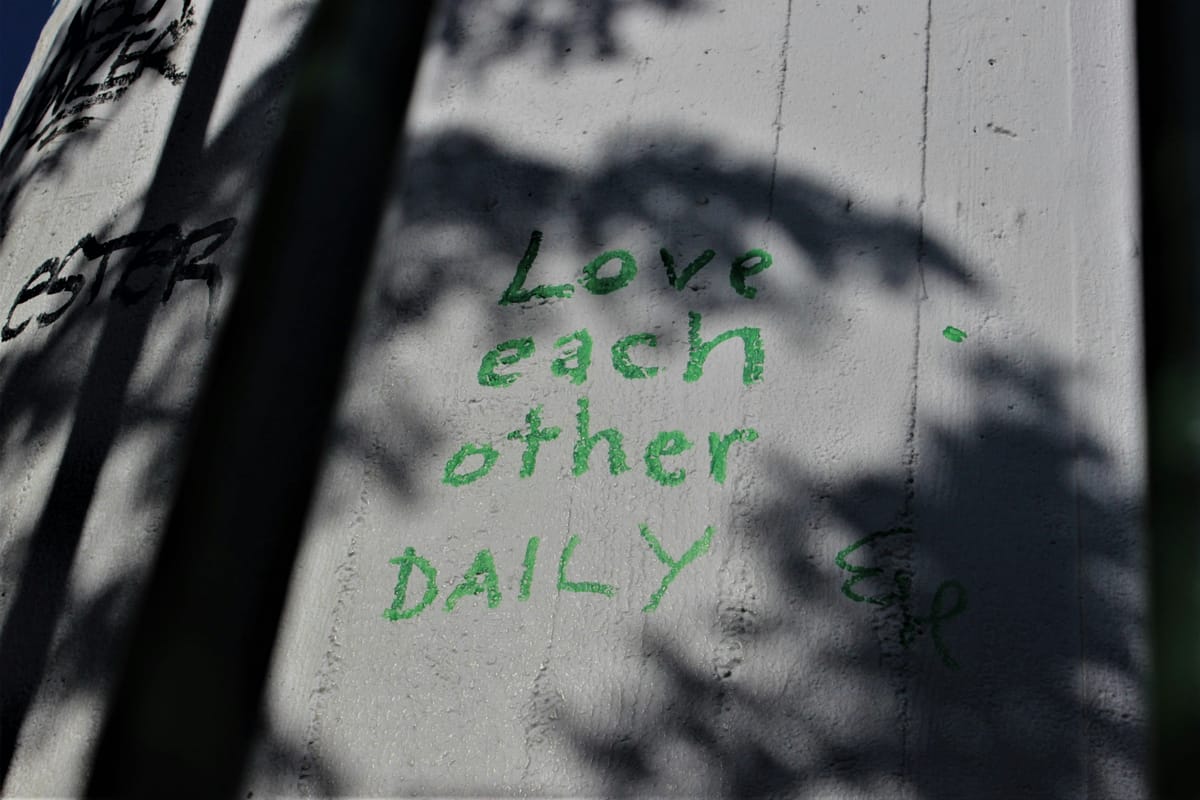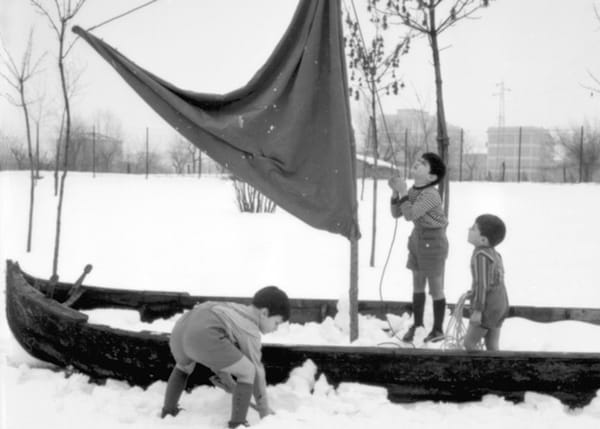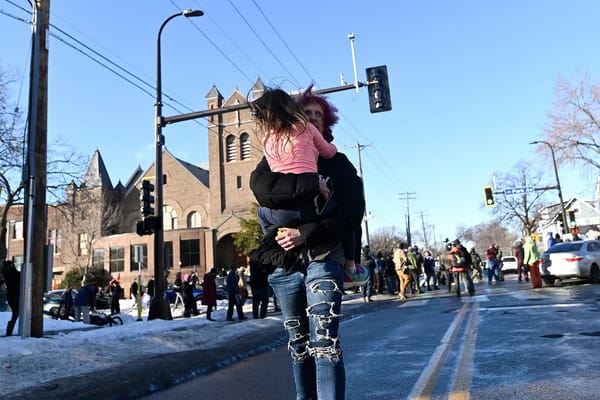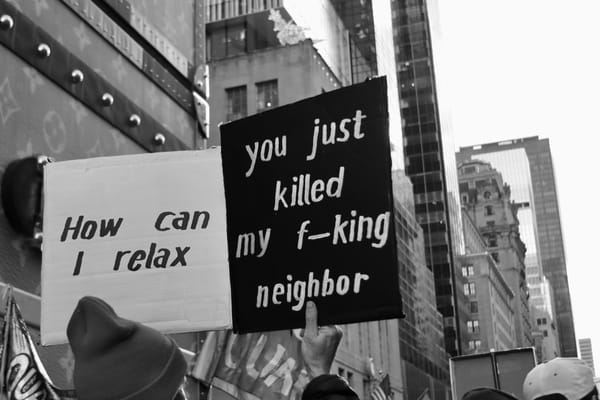Protecting a Future Worthy of Our Fight
What version of the future do we wish for our children?

“And we can churn at all that goes wrong
but then we must lay all distractions down,
and water every living seed.”
~Mark Nepo
I’ve spent a lot of my career writing about empathy, mainly from the perspective of how we understand and cultivate it in our children, as teachers and parents. But beginning with the “how” of empathy presupposes a general agreement that empathy is a fundamentally good trait, worthy of fostering in our children, as we consider the adults we hope they will become. As much as I would like to believe that this is a baseline assumption we can safely make, it isn’t. This is not only apparent in recent media attention on powerful political figures railing against empathy as “a sin” and a “fundamental weakness,” but throughout the history of empathy’s place in the understanding of moral development.
I take comfort, particularly as fear and cruelty rage all around us, in the fact that empathy has become so central to the mainstream understanding of morality that these statements elicited strong rebuke from many people. But, having spent a lot of time reading and writing about empathy, I also think it’s important to pause and take note of just how recent and delicate this understanding is. New ideas are fragile and prone to backlash, as old currents almost always seek to reestablish themselves. If we want to protect the viability of a new idea or value, it’s essential to understand the longstanding counternarratives that bolster arguments against it, because old ideas are stubborn and powerful.
Just as Western culture is steeped in a long history of rejecting the inherent worth of diversity, our understanding of morality is also rooted in a long history of thought that rejects the inherent worth of empathy. These mental lineages are deeply interwoven, and the ripple effect of this marriage of ideas—the devaluing of diversity and of empathy—has been a braided thread in many of our cruelest and most brutal pages in history.
If we want to protect the ideals and values that grow from the elevation of empathy, then it is worth understanding the roots of its rise within our cultural definition of moral good, as well as the history of thought that has long rejected empathy and continues to provide the intellectual basis for its rejection by those in power today.

In a nutshell, until pretty recently, empathy was understood as a phenomenon we ought to strive to move beyond, because empathy is fundamentally rooted in an emotional experience, and emotion has long been viewed as an obstacle to reason, with reason positioned as the primary distinguishing trait of humanity and the goal of moral development. But this perspective ignores both the significant potential for good that our emotional connections can foster and the full scope of the research on empathy, which reveals a more complex mental process, requiring both emotion and rational cognition. As the researcher, Ilya Lyashevsky, explains,
“Empathy is generally thought to encompass at least two processes or components: emotional empathy and cognitive empathy. Emotional empathy refers to feeling what someone else is feeling, for example, feeling the sadness of someone who is crying. Cognitive empathy refers to an understanding of the other’s emotional state, for instance, understanding that the crying person’s sadness is caused by the loss of a loved one or by a deep disappointment.”
Lyashevsky goes on to explain that the interaction between emotional and cognitive empathy is what allows us to extend our empathetic care beyond those we know, countering a supposition about the limits of empathy that has long been central to the case for viewing reason as a superior moral force—that the reach of empathy is limited by proximity and personal relationships. Instead, Lyashevsky says,
“A wealth of neuroscience research on perceiving and interpreting emotions has shown that when we cognitively represent another’s emotional state, we embody or simulate that state via our own emotion system, causing us to experience a version of that emotion. In other words, even if there is no crying person before us whose pain we can feel, simply imagining a person in distress will generally activate both cognitive and emotional empathy.”
This description of our capacity to extend an embodied sense of emotional connection beyond our immediate sphere to those we don’t know or have any personal exposure to is particularly clear in the research of Mary Helen Immordino-Yang, who has demonstrated that we respond neurologically to other people’s stories in the same way we respond to those we know intimately and in the same way we experience our own individual distress. These connections are so fundamental to our humanity that they are anchored in our most basic biological survival. She explains that, whether we are responding to a loved one or to the story of someone we don’t know at all,
“We feel our social relationships so directly and so painfully and so pleasurably, because they literally hook themselves into the biological machinery that keeps us alive.”
This research is based on exposure to individual stories, which is sometimes at the root of critiques of empathy when the notion of “a greater good” is pitted against the needs of individuals. The idea is that empathy for individual suffering impedes our ability to prioritize large-scale suffering. This is a tempting argument. When presented as a binary choice, it can seem clear that we should prioritize the many over the few. However, this construction often creates a false choice, and the frequent framing of moral decisions that presumes this dichotomy as a given primes us to view our choices accordingly and make trade-offs that might not actually be necessary—as if we have no alternative but to barter aid and suffering like poker chips. Once the presumption of a greater good is established, we are more likely to expect and accept sacrifices or "collateral damage” as a necessary feature of a moral decision.
This construction also presents a false binary in our mental processing by presuming that empathizing with an individual within our reach will inhibit us from empathizing with those whose cries are farther away or more numerous. While it is true that it’s easier to ignore the plight of those we can’t interact with directly or of suffering at enormous scale, this trap arises primarily out of our sense of helplessness and can become a barrier whether we are grounding ourselves in reason or in empathy. But empathy, more than reason, has the cognitive power to push us beyond helplessness, because our care allows us to disregard what may seem irrational or improbable.
The research indicates that feeling an emotional connection to an individual or to their story is more likely to expand our care than to contract it. Care for the individual has the power to catalyze care that is more wide-reaching, because it reasserts the human connection. This is why a single story can spur us to change our beliefs, behaviors, and engagement in larger issues. The ability to ignore suffering, whether on an intimate or a large scale, is more probable when we reject the value of our emotional connections, because as Lyashevsky notes, “without emotional empathy, rationality becomes unmoored from humanity.”

The current rejection of empathy is particularly bold and extreme. Susan Lanzoni, an historian of psychology, recently told the reporter, Julia Carrie Wong, that throughout her research on the history of empathy, she had “never seen empathy vilified in the way it has been in these current sources.”
The rhetoric that has hit recent headlines doesn’t merely posit that empathy is an impediment to rationality. It positions empathy as a destructive force. The rejection of empathy that describes it as a sin extends the abstract concept of a greater good into the future and takes the apocalyptic stance that empathy for those in the present will lead to the future destruction of humanity, by limiting our willingness to make sacrifices for the preservation of our species. Sometimes this is positioned within the language of empathy as “empathy for civilization” over individuals, and sometimes it is positioned as a complete rejection of empathy, likening individual emotional connection to a parasitic infection.
In either formulation, these ideas are anchored very directly within the history of eugenics, given new life in constructs such as “longtermism,” which sounds like it is a system of thought intended to help us protect the welfare of future generations, but is actually much more sinister, with a goal of not only preserving but perfecting the species through a calculated utilitarian assessment of worth that reduces individuals to variables in a vast, grim equation. As we’ve seen when such ways of thinking have risen to prominence in the past, this version of morality easily justifies profound and widespread suffering. As the researcher and philosopher, Émile P. Torres, explains,
“The underlying reasoning here is based on the idea that people – you and I – are nothing more than means to an end. We don’t matter in ourselves; we have no inherent value of our own. Instead, people are understood as the ‘containers’ of value…In a phrase: people exist for the sake of maximizing value, rather than value existing for the sake of benefitting people.”
It is true that we are facing existential threats. However, viewing morality through the narrow if long lens of preserving and maximizing our species, even at the cost of massive suffering, begs two critical questions. First, at what point does a perceived greater good in the future create so much suffering in the present that it no longer satisfies any acceptable moral construct, regardless of whether empathy or reason is your starting point? And, second, is this version of the future one that is even worthy of our protection?
Would we want our children, or anyone’s children however far into the future we attempt to peer, to live in a world that views their lives as mere vessels for quantifiable value, easily sacrificed to an algorithm of ideal worth? I’ve written previously about the need to look beyond our immediate moment to consider how our choices in the present will impact our children and future generations of children. I do think it’s valuable to reflect on what we might sacrifice today to protect a world we won’t ever know for those that will come after us. But would we wish a future on our children, or the generations to come, that is devoid of the meaning and fulfillment inherent in emotionally connected relationships and in feeling the deep sense of belonging that empathy facilitates? In addition to its moral role, empathy is the antidote to isolation; it is the visceral reminder, embedded deep in our brains and our bodies, that we are not alone. Would we trade this for a cold calculus of perpetual existence?
As we consider the function of empathy for those in the present, whether we are speaking of the individuals we are intimately connected to or of suffering at a greater scale—and even as we consider empathy from a future oriented stance, seeking to imagine the lived experience of our children and of the generations beyond their lifespan—we have to have the humility to wonder what value is truly found in the mere perpetuation of humanity, rather than in the fragile and finite nature of our delicate but profoundly interwoven human experience.
Finding meaning in our existence is, after all, deeply rooted in our mortality—in the preciousness that comes of knowing we do not have forever, as individuals and perhaps even as a species. When we speak of the greater good how we envision the texture of that good matters. Would we continue on forever if forever was a cold and isolating expanse? Would we consign our children to that future? Or, given that choice, would we accept our fragility in order to preserve meaning, connection, and care for however long our flicker of time in the cosmos might last?
As the poet Andrea Gibson reminds us,
“...I did not meet this life until I met its brevity.
Did not meet my voice until I knew every word
could be my last. I did not know what prayer was
until I started praying for what I already have.”
Wishing you care and connection within the flicker of time we inhabit,
Alicia
A few things I found helpful and hopeful this week…
- Chicago teachers cemented LGBTQ+ rights and protections for students in their contract, using their collective power as educators to stand up for kids.
- Whatever it takes to keep kids alive. The stories told here are both heartbreaking and inspiring. Families are fighting with all they have to protect their children from policies aimed at erasing them.
- What if we get it right? Ayana Elizabeth Johnson is a voice of hope, knowledge, and practical inspiration within the often bleak field of climate change.
If you think someone else in your life might need some hope, please share. It’s always easier to hold onto hope when we’re not doing it alone.





